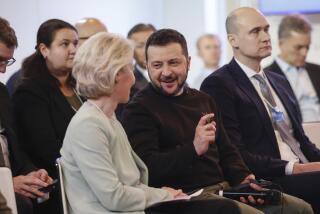Leaders Pledge to Help Soviets Shift Economy
- Share via
LONDON — Leaders of the world’s major industrial democracies, responding to President Mikhail S. Gorbachev’s plea for aid, pledged Wednesday to help the Soviet Union shift its economy onto a free-market basis, but they stopped short of providing large-scale financial assistance.
The Group of Seven told Gorbachev that their countries would provide extensive advice on economic reform, technical assistance in modernizing his country’s industry and support in integrating the Soviet Union into the world economy.
They were clearly reluctant, however, to provide the billions of dollars in assistance that Gorbachev had argued for to underwrite the difficult initial stages of the Soviet reforms, promising only to look again at Moscow’s needs after it begins to implement its economic transformation. This was stressed in comments by British Prime Minister John Major, the chairman of the meeting.
The blunt statements of what the major industrialized nations will, and will not, do to help Gorbachev and his foundering nation climaxed a four-hour closed-door meeting that may have been the most dramatic episode in the 17-year history of economic summits--an encounter all the more powerful because Gorbachev had labored for more than two years to have it.
Never before had the president of a nuclear superpower been compelled to defend his policies and his leadership before the heads of other sovereign governments. And never before had the proud leader of the world’s first socialist state endured such face-to-face questioning at the hands of the men who hold the reins of global capitalism in a desperate effort to save his country.
“The pressure on the president was intense--he knew that the future of his reforms and, to some extent, the future of our country depended on his performance,” said a Gorbachev aide. “We want this assistance from the West, we need it, our strategy depends on it.”
So intense was the session, held in Lancaster House, an elegant, 19th-Century stone structure near Buckingham Palace, that it left the normally energetic Gorbachev physically drained. He had to call for a brief rest break before addressing the news conference that followed.
“We’re going through a difficult time now,” Gorbachev said afterward. “We shall find our way through this period, we will pull ourselves out, whether you help us or not.”
But he, as well as the Group of Seven leaders who had questioned him so closely, saw significant gains coming from the meeting.
“We are not even talking about assistance here,” Gorbachev declared. “We are talking about a new quality of cooperation when we become organically part of the world’s economic space.”
In substantive terms, the Group of Seven spelled out a six-point commitment during its meeting with Gorbachev at the conclusion of its annual economic summit conference, which had discussed many far-reaching issues of global importance but had been overshadowed by the Soviet leader’s first appearance at the forum.
“We all agreed to work together to promote the integration of the Soviet economy into the world economy,” Major said later, “but we also agreed that our help would not have lasting effect unless there was a clear political will in the Soviet Union to create the environment for change.
“Our objective must be to help the Soviet Union in mobilizing its substantial resources. Outside assistance can make a contribution--it can help to catalyze the process--but the Soviet Union itself must mobilize its resources.”
Gorbachev accepted the decision as sufficient to open possibilities of much broader economic cooperation with the West, including multibillion-dollar projects to develop Soviet natural resources.
The meeting was a breakthrough at the highest political level, he told a press conference with Major, and that in time should bring the economic assistance that Moscow will need as it tackles such tough problems as making the Soviet ruble convertible into other currencies.
“This wasn’t a meeting of finance ministers, but of heads of state,” Gorbachev replied when questioned about his failure to win pledges of financial assistance. “As we assess the political results, they go well beyond (the speculation) that was in the press.”
The six-point program announced by Major provides for associate membership for the Soviet Union in the International Monetary Fund and World Bank to provide it with immediate assistance in planning and carrying out its reforms and further advice on its plans to free prices, attract foreign investment and privatize large portions of its state-owned economy.
The G-7--Britain, Canada, France, Germany, Italy, Japan and the United States--also promised help to modernize the Soviet Union’s energy industry, to convert much of the defense industry to civilian production, improve food distribution, increase nuclear safety and develop transport. They will provide further assistance in privatizing state enterprises.
For Gorbachev, however, the most important commitment was to develop the dialogue begun here, reviewing the Soviet Union’s progress in carrying out the reforms and institutionalizing the relationship to the point where both he and Major spoke of the “Seven Plus One.”
Wednesday’s meeting between Gorbachev and the seven leaders consisted of the heads of government alone, without their usual phalanxes of aides. And no detailed accounts of what transpired have been released.
But the participants made clear that the encounter turned into an intense exchange between Gorbachev and the others on the next stage of the Soviet Union’s political and economic reforms. There were many hard questions on how he intends to carry them out and pointed advice on what a free-market economy really means, they said.
“In keeping with the summit’s style, the emphasis has been on informal, frank and direct discussions,” Major said dryly. “Questions were put across the table, and answers were given.”
Although he had already outlined his program in a 23-page letter last week, Gorbachev began with a summary of the planned reforms--the Union Treaty that will lay a new constitutional basis for the country, the centrist political accord he is building with other leaders and the economic transformation that will end seven decades of state socialism.
The program Gorbachev presented was based on the government’s stage-by-stage plan for stabilizing the Soviet economy and recommendations from outside economists for accelerating the shift to a market economy. Most of Gorbachev’s initial presentation was “conceptional,” according to Vitaly N. Ignatenko, his press secretary, but it also took into account some of the early foreign criticism.
Each of the other leaders had questions, some of them sharp. Bush and others pressed Gorbachev hard on the Soviet Union’s heavy military spending, which still consumes more than a fifth of the country’s national income.
There was also a Bush question on the Soviets’ continued aid to Cuba when their own economy is in such desperate shape.
For all that he faced, Gorbachev struck a senior U.S. official who was present at his luncheon meeting with Bush as confident and articulate. A European official said he had put the full force of his personality into explaining his program.
What Ails the Soviet Union?
Here’s a brief look at key symptoms of the ailing Soviet economy:
Foreign Debt: Latest figures show that the Soviet Union’s foreign debt is $70 billion, up from $55 billion as of June, 1990.
GNP: In the first six months of 1991, industrial production dropped 6.2% and the Soviet equivalent of gross national product plunged 10%.
Inflation: The government increased retail prices by 250% to 1000% on April 2 to bring them in line with production costs.
Deficit: The national budget deficit jumped 230% in the first quarter of 1991 compared to the same period last year.
Unemployment: Last year the state Statistics Committee said 24.8 million Soviets were unemployed out of a national population of 289 million.
More to Read
Sign up for Essential California
The most important California stories and recommendations in your inbox every morning.
You may occasionally receive promotional content from the Los Angeles Times.













